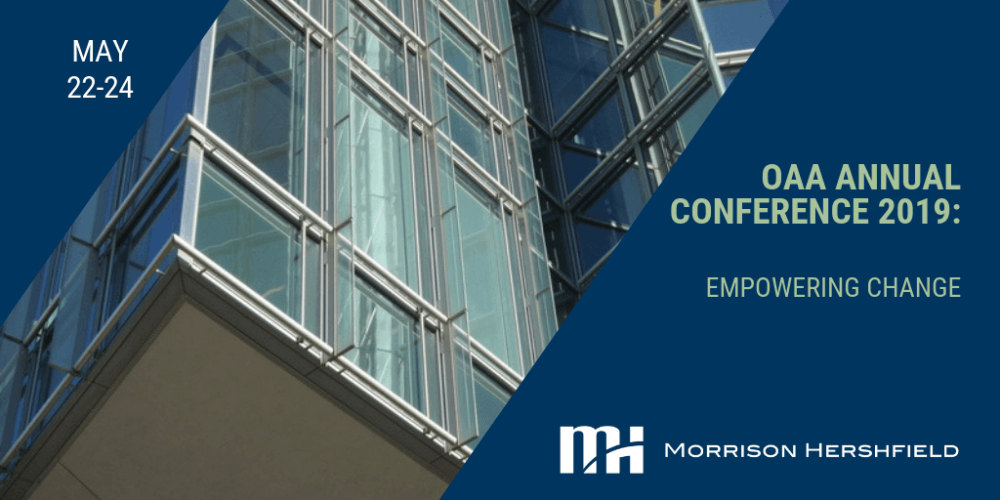
- This event has passed.
OAA Conference 2019: 4 Presentations
May 22, 2019 at 8:00 am - May 24, 2019 at 5:00 pm UTC-5

The Ontario Association of Architects (OAA) Annual Conference is making it’s way to Quebec! This year’s OAA Conference theme is “Empowering Change,” sessions will explore how architecture can help to solve problems from climate change to housing affordability to social cohesion.
Our team will be presenting four sessions at this year’s conference!
More information and registration here.
Session #1: QA, QC, and QF – An Alphabet Soup of Standards is not Enough
Global procurement is often relied upon for curtain wall, window wall and other fenestration systems and components. Global procurement has its opportunities and risks. Opportunities include reduced product cost and fabrication capabilities that are not available, or have only limited availability in North America such as jumbo-size low-emissivity coated glass and insulating glass units. Risks include language and cultural differences and long distance communication across many time zones causing confusion in design, ordering, delays in delivery, and problems with product quality. Nevertheless, the fiscal advantages can be considerable.
Ensuring acceptable quality off-shore products is not just a matter of writing into a specification a requirement to comply with applicable building codes, standards and industry practice documents. These technical documents contain surprising limitations and omissions so that despite best efforts, a Quality Assurance (QA) plan and Quality Control (QC) program may not achieve the desired quality outcome. Even if initial product quality samples and production are correct, quality may diminish over time, an effect known as Quality Fade (QF). Whether or not fenestration systems are globally or locally procured, the building owners, the design team and the construction team should be aware of omissions and limitations of industry practices and standards to avoid unexpected surprises too late in the construction process to make changes.
This session will be presented by George Torok, Senior Facade Specialist, and will take place on Wednesday, May 22 at 2 pm and on Thursday, May 23 at 10:30 am.
Session #2: Change of Use – Application of the Ontario Building Code
This session walks attendees through the fundamentals and requirements of the Ontario Building Code for changes of use to existing buildings. It focuses on three key areas: application (i.e. when is the Code applicable?), requirements (i.e. the process of determining what requirements apply to a change of use) and working through examples and applying tips and tricks to make the process easier.
Learning Objectives
- Understand what constitutes a change of use per the OBC.
- Know the basis of Code requirements from the Building Code Act.
- Be able to assess hazard index and construction index of existing and proposed construction.
- Apply the requirements for analyzing early warning and evacuation systems.
This session will be presented by Judy Jeske, Senior Code Specialist, and will take place on Wednesday, May 22 at 2 pm.
Session #3: Building Envelope Commissioning – Plan for Success
This presentation focuses on the importance of the building envelope for new and retrofit projects, and its ability to satisfy not only the expectations of an owner, but also meet the performance requirements for efficiency, resiliency and durability. The session includes discussion on the critical and various stages of the Building Envelope Commissioning (BECx) Process, starting with the overarching Owner’s Project Requirements (OPRs) and finishing with the Building Envelope Retro-Commissioning Plan. Components of the process will be illustrated with examples from various case studies across Ontario and Canada.
Learning Objectives
- Understand the importance of the building envelope in new construction and retrofit applications.
- Understand Owner’s Project Requirements and Performance Criteria.
- Become familiar with the various stages of the BECx process and be able to identify the critical steps for its implementation.
- Be able to connect the BECx process to real work applications through case studies, and see first-hand how the process relates to a modern construction process.
This session will be presented by Peter Adams, Senior Building Science Specialist, and will take place on Wednesday, May 22 at 4 pm.
Session #4: Net Zero Carbon and Passive House – Easier Than You Think
Stringent overall performance requirements are compounded by component-specific or assembly-specific criteria. In addition, design solutions often require careful integration between the architectural design, energy modelling, envelope design and mechanical design.
The relative impact of thermal bridging and envelope transitions is amplified in low energy buildings. Accurately quantifying thermal bridging effects and finding innovative design improvements to key details is an essential part of Passive House certification.
The presentation will discuss the counter-intuitive mechanical design challenges arising from very low heating and cooling loads and the year-round challenge of simultaneous heating and cooling needs within a floor plate. The different control logic and operating schedules of low energy systems must be carefully coordinated with energy modellers to ensure an accurate model.
This session will be co-presented by Steve Murray, Senior Building Science Consultant, and Alejandro Ortega, Senior Mechanical Engineer, and will take place on Friday, May 24 at 8:30 am.